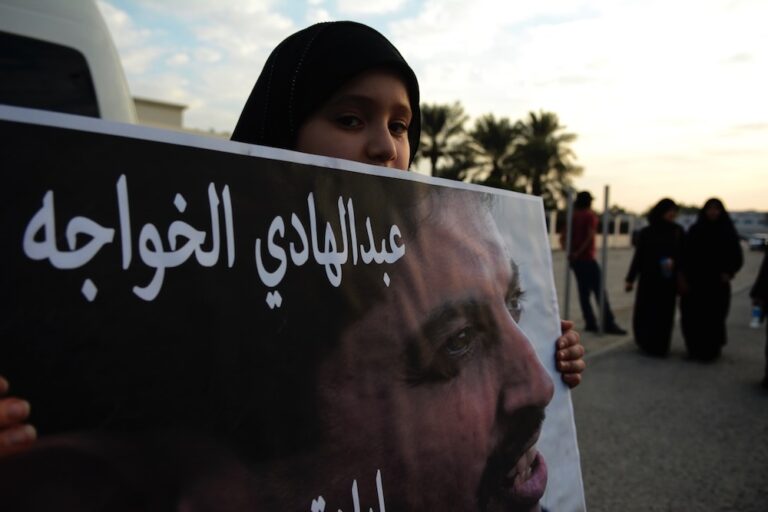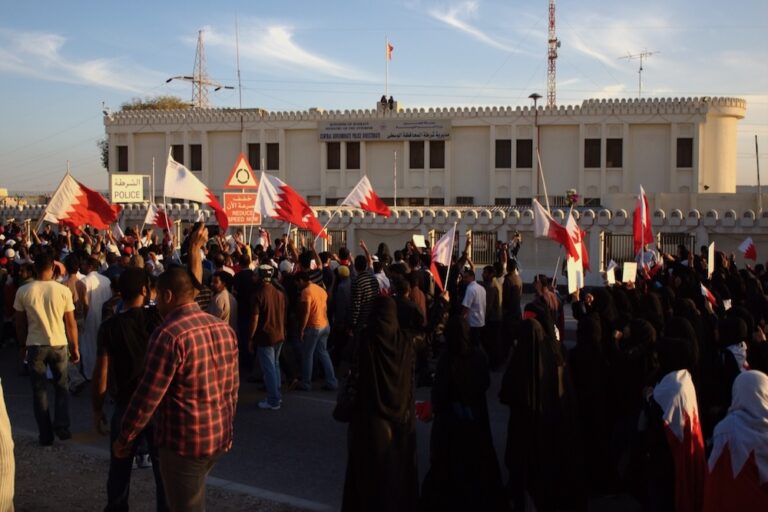Private photos and videos of the human rights lawyer Mohamed Al-Tajer and his wife have been circulated online via pro-government forums and social media accounts.
(BCHR/IFEX) – 5 June 2012 – The Gulf Center for Human Rights (GCHR), the Bahrain Center for Human Rights (BCHR), the Bahrain Rehabilitation Against Violence Organization (BRAVO), and the Bahrain Human Rights Society (BHRS), express grave concern regarding the act of humiliation, intimidation and violation to the privacy directed at the prominent human rights lawyer, Co-founder and Executive Director of Bravo Mohamed Al-Tajer, days after his participation at the Bahrain UPR meetings in Geneva.
The above mentioned NGOs received information that private photos and videos of the human rights lawyer Mohamed Al-Tajer and his wife have been circulated online in the past two days via pro-government forums and accounts on the social media.
The Human Rights lawyer, Mohamed Al-Tajer, stated that he had previously provided testimony to the Bahrain Independent Commission of Inquiry BICI that “he was videotaped sleeping with his wife and that he was threatened that this tape would be made public.” (BICI 1261.b)
According to Al-Tajer’s testimony, after spending a night at his beach house with his wife, more than a year ago, he started receiving threats, dating back to January 2011, from someone he believes are intelligence agents of the Bahrain government. Al-Tajer was told that they had installed cameras in his beach house, and now had a tape of him being intimate with his wife. The threats targeted his work, and he was told if he does not stop his human rights work they would release the tape. In January 2011 Al-Tajer was defending a group of opposition activists and he led a distinguished protest movement inside the court when he withdrew from the trial for lack of fair trial basis, and was followed by 45 other lawyers, a move that attracted attention to the problems of the judicial system in Bahrain.
Al-Tajer refused to be blackmailed and continued with his work as a human rights lawyer. During the popular protest last year, Al-Tajer reportedly made a speech in which he addressed the public in the Pearl Roundabout’s in March 2011 to denounce Bahrain’s human rights record.
In April 2011, after the crackdown on the protesters, Al-Tajer received more threats, but he continued to express his opinions over the media, and he was eventually arrested on 15 April 2011 by a group of more than 20 masked and armed plain-clothes men, belonging to security forces who raided his house after midnight. He was held incommunicado until he appeared before the National Safety Court (Military) on June 12, 2011 on charges of inciting hatred against the regime, releasing of false news and taking part in a demonstration. During his detention, Al-Tajer was subjected to torture and ill-treatment. He was kept in solitary confinement during seven weeks, beaten and kicked, forced to stand for long hours with his hands against the wall, prevented from going to the bathroom, sleeping, talking
with other detainees and having contact with his family during two consecutive months. On August 6, 2011, after 114 days of detentions, he was released on bail. The trial against Al-Tajer has not been concluded until today and the next hearing session is scheduled on 26 June 2012, where the public prosecution has not open an investigation in the complain of Al-Tajer against torture until now. Items confiscated during the arrest, including confidential lawyer client information, as well as family pictures and videos have not been returned to him. Additionally, Al Tajer’s telephone communications and circulation allegedly remain under close monitoring by the National Security Intelligence.
More specifically, after participating at the UPR process in Geneva last month, Al-Tajer received text messages on his mobile threatening him not to take part in a conference held to discuss the UPR meetings by the Bahrain National Democratic Action Society on Wed 30 May 2012, and when he did, the video was released the next day. The video was released on a pro-government website, Bahrain Forums, which has played a huge role in spreading sectarianism and conducting attacks and defamation campaigns on people who are part of the opposition and/or activists.
Unfortunately this would not be the first time the government of Bahrain has breached the privacy of activists and launched personal attacks to blackmail them into stopping their human rights work. Last year, the private photos of young female poet Ayat Alqurmozi showing her without her Muslim veil were made public over social media websites, after arresting her and confiscating her photo albums by state security. In 2008, the house of the woman human rights defender Ghada Jamsheer was reportedly broken into by a state security agent and detailed photographs were taken while she was away.
Due to the policy of personal attacks, all activists feel insecure in their own homes, with the imminent threat that the government may have installed cameras in their homes as well. Many of those who were arrested had their private photo albums and CDs confiscated by security forces and fear that it may be published and circulated online.
The attack on Al-Tajer comes after a series of attacks in the local media against those who took part in the delegation to the Human Rights Council for Bahrain’s UPR process. Members of that delegation have continuously been called “traitors”, agents of Iran and disloyal, amongst other things. Laura Dupuy Lasserre, President of The UN Human Rights Council made an ‘unprecedented’ statement at the last day of the UPR meetings in calling on Bahrain not to make reprisals against opposition activists, attending the Universal Periodic Review. However, it seems that the Bahraini government has found alternative ways of reprisal.
Based on the above, The GCHR, BCHR, BRAVO and BHRS call on the government of Bahrain to:
– Immediately hold accountable those responsible for the recording and publishing of the private photos and videos of lawyer Mohamed Al-Tajer, including, first and foremost, the previous head of the national security apparatus Sheikh Khalifa bin Abdullah Al-Khalifa, who was in charge at the time the videos were taken.
– Drop all charges against lawyer Al-Tajer as it’s believed he is targeted merely for practicing his human rights work and the legitimate exercise of freedom of expression.
– Hold accountable those responsible for the torture of lawyer Mohamed Al-Tajer.
– Immediately put a stop to the use of personal attacks and breaches of privacy to blackmail activists.
– Guarantee the protection of all activists who have participated in the UPR meetings from all acts of harassments, intimidation and reprisal who maybe directed against them for their role in exposing the regime’s crimes.
– Guarantee in all circumstances that all human rights defenders in Bahrain are able to carry out their legitimate human rights activities without fear of reprisals and free of all restrictions including judicial harassment.
We respectfully remind you that the United Nations Declaration on the Right and Responsibility of Individuals, Groups and Organs of Society to Promote and Protect Universally Recognized Human Rights and Fundamental Freedoms, adopted by consensus by the UN General Assembly on 9 December 1998, recognizes the legitimacy of the activities of human rights defenders, their right to freedom of association and to carry out their activities without fear of reprisals. We would particularly draw your attention to Article 5 (b) which states that: “For the purpose of promoting and protecting human rights and fundamental freedoms, everyone has the right, individually and in association with others, at the national and international levels: (b) To form, join and participate in non-governmental organizations, associations or groups;” and to Article 12.2, which provides that “the State shall take all necessary measures to ensure the protection by the competent authorities of everyone, individually and in association with others, against any violence, threats, retaliation, de facto or de jure adverse discrimination, pressure or any other arbitrary action as a consequence of his or her legitimate exercise of the rights referred to in the present Declaration.”



